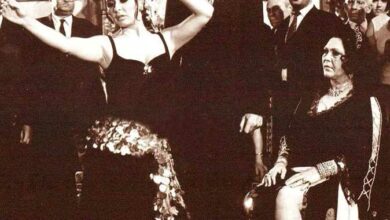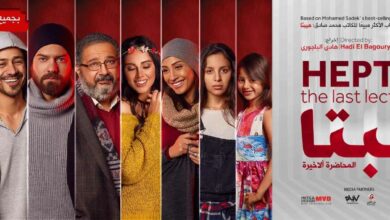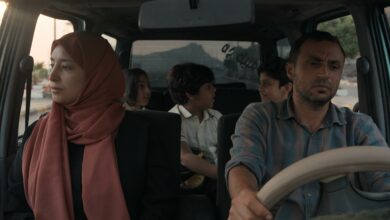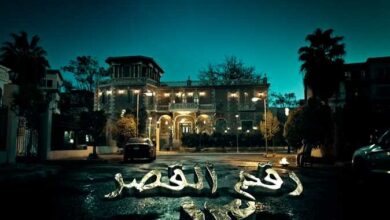LONDON – Over the past week, London’s Institute of Contemporary Arts hosted the “Winds of Change: Cinema from Muslim Societies” festival, using the Arab Spring as the starting point for selected films.
At first glance, this is hard to fathom as only four of the films come from the Arab world (Egypt, Palestine, Syria and Tunisia) and all were made pre-2011.
However, this was exactly the point of the festival. It aims to broaden the debate over the Arab Spring to show that there are roots and a deeper context to events this year that stretch back into the 20th century and into sub-Saharan Africa and Asia.
The “Arab Spring” is a popular buzzword these days, but very often missing from mainstream discourse is recognition that the uprisings and revolutions of the past year did not begin with the Tunisian “spark” in Sidi Bouzid, nor will they likely end with the fall of any one political leader. To quote Hamid Dabashi, professor of Iranian studies and comparative literature at Columbia University who spoke at the festival, the idea is “not total revolution, but open-ended revolution.”
Nadje al-Ali, professor of gender studies at the University of London's School of Oriental and African Studies, also speaking at one of the festival debates, said she is “uncomfortable” with the term Arab Spring as it ignores broader regional dynamics, such as the Iranian Green Movement. To that end, the program includes Ali Samadi Ahadi’s “The Green Wave” (2010), depicting Iranian popular demonstrations against the conservative rule of President Mahmoud Ahmadinejad.
“Winds of Change” has chosen films that are diverse, stylistically, thematically and geographically. This is deliberate, as the curators have aimed to cover a lot of ground to “make the case for the huge range of Arabic and Islamic cinema.”
The oldest film shown was “Ceddo” (1977) by Senegalese director Ousmane Sembène. Filmmaker and writer Imruh Bakari positions this as a seminal piece of African filmmaking, and one still highly relevant to today’s politics and society. It is not a historical film, nor does it rely on realism, offering “caricatures not characters,” says Bakari. It takes elements from 18th and 19th century placed into “an identifiable 19th century context to make a political point.”
“Ceddo” has been accused of being critical of Islam, and its portrayals of religious leadership are certainly less than favorable. However, it should perhaps be seen as more a critique of ruling elites and power games, one that addresses the contentious issues of religion and what is "foreign" in African society, the ongoing legacies of colonialism and slavery, and, most relevant to this festival, the dynamics of resistance and dissent.
However this particular film is received, according to Welsh broadcaster and writer Merryl Wyn Davies, there is no shortage of negative portrayals of Islam in film. Davies, speaking during the festival, argues that it is in Hollywood cinema that a “fictive Muslim world exists,” one shaped by Orientalism and Islamophobia, that distorts meaningful debates on the Muslim world by presenting “a solid object” that can be pitted in opposition to perceived Western values.
Screening films that emanate from Muslim cultures and communities, whether they deal explicitly with Islam or not, will surely go some way to address this imbalance. It will also help to open up the term "Muslim world," which can be a problematic concept in itself – imposing a homogeneity that glosses over vast differences found in ethnicity, sect, class, gender and so forth.
Turkish film “Takva” (2006), directed by Ozer Kiziltan, offers a snapshot of this diversity and in doing so is a step away from reductionist stereotypes of Muslims that are common in much Western cinematic discourse. It takes us into the world of a Sufi religious order in Istanbul through an intimate portrayal of a pious and humble man’s internal struggles between worldly temptations and his own god-fearing nature. It is a comment on the delicate and often fraught balance between the material and spiritual worlds, offering a rendering of Islamic belief that is accessible, universal and ultimately very human.
Tunisian Moufida Tlatli’s “Les Silences du Palais” (1994) and Palestinian Annemarie Jacir’s “Salt of This Sea” (2008) portray very different narratives of Arab women.
“Les Silences du Palais” was undoubtedly a highlight of the festival. Beautifully shot and quietly filled with loss and anguish, this film depicts the precarious lives of the "servant class" of women in a palace toward the end of Tunisia’s colonial era. It is described as “one of the most distinguished feminist films from the Arab world” by Ros Gray, lecturer at Goldsmiths College at the University of London, who adds that “the questions raised in Tlatli’s film have lost none of their potency or urgency in almost two decades since its release, and the Arab Spring has refocused the tension around the role of women in society, as Egyptian and Tunisian women were at the forefront of the revolutions still ongoing.”
“Salt of this Sea” meanwhile is contemporary in its setting, as the story of a return from America to Palestine. Its producer, Maya Sanbar, explains how its two main characters represent two main elements of Palestinian identity. Soraya (Suhair Hammad) is part of the diaspora, idealizing the homeland and longing to return, while Emad (Saleh Bakri) lives in Ramallah, imprisoned by Israeli occupation and desperate to escape. This film has received much international attention, taking on the issues of the right of return and Israel’s occupation of Palestine – both integral to the broader regional dynamics of the Arab Spring. Despite this, it was overshadowed by other more accomplished films in this festival, lacking the subtlety, depth or beauty of “Les Silences,” for example.
The films that speak most directly to the wave of uprisings this year are, not surprisingly, also the most recent. Along with “The Green Wave” were the Egyptian film “Microphone” (2010), by young director Ahmad Abdalla that featured in last year’s London Film Festival, and “The Long Night” (2009), a debut by Syrian director Hatem Ali.
"Microphone," fatefully released in Egypt in January, explores underground culture in Alexandria and is an adrenalin-fueled depiction of the un-containable energy of youth in the face of huge obstacles. Filled with music, excitement, disappointment and frustration, it has received worldwide acclaim and is now credited with great insight into Egypt’s revolution.
“The Long Night” also reaches back past the uprisings this year, and is about political prisoners in the '90s. Filled with long silences that hint at all that cannot be said, this film tells the story of four men who have spent years, possibly decades, behind bars and all the agonizing complications their incarceration and imminent release has for their relationships, for their families and for Syria.
This film has been shown internationally, but, tellingly, never in Syria and is acutely and painfully relevant to today. As writer and journalist Robin Yassin-Kassab, introducing the film, noted “Syrian society is still suffering a long night.”
“Winds of Change” ran from 21 to 25 September at the Institute of Contemporary Arts. It was organized in collaboration with international art journal Third Text, and included a special issue of Third Text (entitled “Cinema from Muslim Societies”), debates on the Muslim and Arab world, as well as film screenings.




